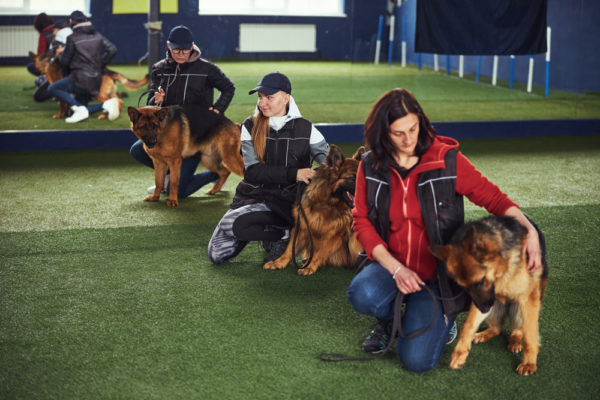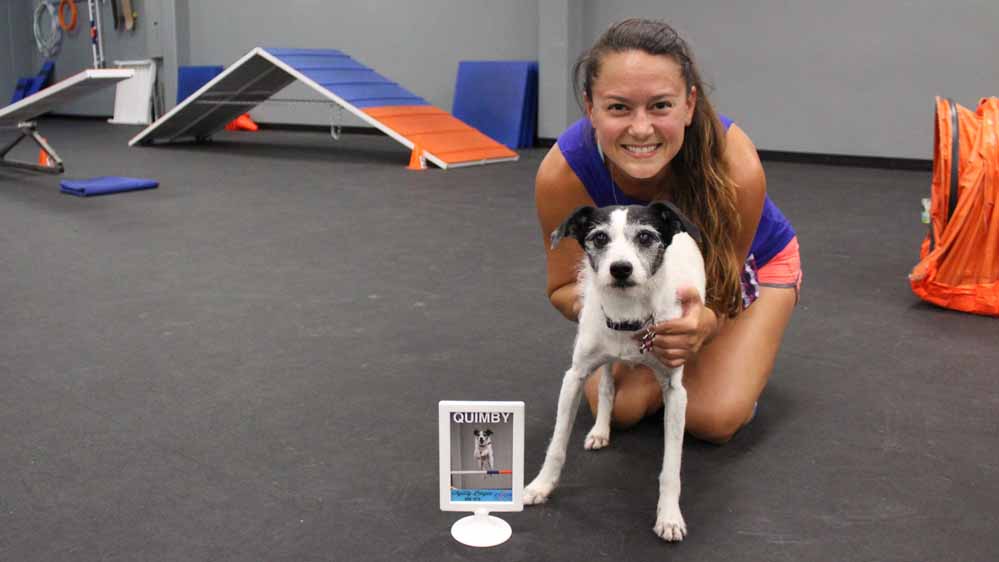Top Pet Dog Training Strategies for Every Stage of Your Pet Dog's Life
Effective pet dog training is important at every phase of a pet's life, as each phase provides special challenges and chances for development - Dog Training For Dogs. From the fundamental bonding techniques required for young puppies to the customized techniques needed for elderly dogs, comprehending these critical periods can dramatically enhance the human-animal bond. It is necessary to recognize that training ought to advance alongside a pet's development, making sure that methods remain pertinent and reliable. What certain methods can be used to resolve the varying demands of your pet as it grows? The solution might shock you.
Puppy Training Basics
Puppy training basics prepared for a mannerly adult pet dog and involve several vital elements that ought to not be neglected. The first stage of training concentrates on developing a strong bond between the pup and its owner, which is vital for efficient communication. Socializing is vital; exposing pups to different environments, individuals, and various other animals helps them create confidence and versatility, reducing the chance of behavioral concerns later in life.
Standard commands, such as sit, remain, and come, develop the structure of obedience training. Using favorable reinforcement strategies, such as treats and appreciation, encourages wanted behaviors and fosters a favorable knowing experience. Uniformity in commands and training sessions is important, as puppies flourish on regular and framework.
In addition, residence training is a vital aspect of young puppy training. Developing a normal timetable for shower room breaks and utilizing assigned locations can aid reduce accidents and advertise good behaviors. Overall, a well-rounded technique to puppy training, integrating obedience, home, and socializing training, establishes the phase for a well-adjusted grown-up dog, guaranteeing an unified partnership in between the pet and its owner.
Teen Actions Management
As puppies develop right into teens, their behavior can change substantially, frequently providing new difficulties for proprietors. This developing phase, commonly taking place in between 6 months and 2 years, is noted by enhanced power degrees, inquisitiveness, and an expanding feeling of independence. Understanding these modifications is important for effective habits monitoring.
Teenagers might display rebellious tendencies, such as disregarding commands they previously mastered or participating in destructive behaviors. Uniformity in training continues to be vital; strengthening discovered habits through favorable support can assist combat these challenges. Brief, interesting training sessions are necessary to keep their passion and focus.

Additionally, establishing a structured regimen can dramatically boost an adolescent dog's sense of safety. Normal workout is vital to carry their power favorably, reducing the likelihood of undesirable behaviors. By utilizing these methods, proprietors can successfully browse the intricacies of teen habits, fostering a well-adjusted, happy canine friend.
Grown-up Pet Obedience Methods

Favorable reinforcement stays an essential technique; satisfying good actions with treats, appreciation, or play encourages conformity. Consistency is vital; the very same commands and rewards must be used by all relative to avoid complication.
Incorporating training into day-to-day routines can also work. For example, method commands check out this site during walks or dish times, allowing training to blend flawlessly into daily life. Taking part in structured activities, like agility courses or obedience courses, can further enhance a dog's skills while providing valuable socializing opportunities.
It is essential to acknowledge that grown-up pet dogs may likewise display stubbornness or complacency. Changing training techniques to maintain their rate of interest, such as varying rewards or presenting brand-new commands, can aid endure inspiration. On the whole, a recurring dedication to obedience training will certainly promote a mannerly and well balanced grown-up pet.
Senior Canine Adjustment Strategies
Recognizing the unique needs of senior canines is crucial for ensuring their convenience and health. As pet dogs age, they may experience a decrease in wheelchair, vision, and cognitive function, demanding tailored adjustment techniques.
First, consider changing the living environment. Make certain that the home is risk-free and easily accessible; eliminate obstacles and supply non-slip surfaces to stop drops. Additionally, take into consideration making use of ramps or steps to help them access their favorite areas.
Secondly, workout must be adjusted to represent decreased stamina and joint wellness (Dog Training For Dogs). Participate in much shorter, more regular strolls, and incorporate mild tasks like swimming, which can be useful for arthritic joints
Moreover, mental excitement remains important. Usage simple challenge playthings or participate in scent work to maintain their minds sharp, while staying clear of overwhelming tasks that might discourage them.
Last but not least, regular veterinary examinations are essential to keep track of wellness changes and adjust care regimens appropriately. By implementing these adjustment strategies, you can enhance the lifestyle for this your senior canine, ensuring they age with dignity and easily.
Lifelong Understanding and Enrichment
While dogs of every ages gain from discovering and psychological stimulation, lifelong enrichment is especially crucial for preserving cognitive health and wellness and emotional well-being in both senior and more youthful pet dogs. Involving activities not only boost a pet's top quality of life however likewise strengthen the bond in between the pet dog and its owner.
Enrichment can take various kinds, including interactive toys, puzzle feeders, and aroma work, which stimulate a pet's detects and motivate analytical. Regular training sessions, including brand-new commands or tricks, maintains their minds sharp and advertises a sense of success. Socialization with various other pets and individuals is equally essential, as it aids avoid behavioral concerns and promotes adaptability.
Moreover, including physical workout into a pet's routine is vital for overall wellness. Activities like agility training, bring, or long walks supply both physical and psychological excitement, making sure canines continue to be delighted and engaged.
Last but not least, think about varying the atmosphere by introducing brand-new locations for walks or playdates. This modification can reignite a canine's inquisitiveness and interest for exploration. Lifelong discovering and enrichment not just contribute to a meeting life but likewise advertise a harmonious connection with your canine friend.
Conclusion
Efficient pet training techniques advance throughout a dog's life, attending to the unique requirements of each developing phase. From establishing foundational abilities in pups to managing adolescent behaviors, enhancing obedience in grownups, and adapting methods for elders, a comprehensive method makes certain optimum communication and behavior. Highlighting routine psychological excitement, socializing, and exercise fosters a balanced and satisfying life for pet dogs. Inevitably, regular application of these techniques contributes to a harmonious connection between pet dogs and their human friends.
Effective dog training is important at every stage of a pet dog's life, as each stage provides distinct challenges and opportunities for growth.Puppy training basics lay the foundation for a mannerly adult dog and entail a number of vital parts that need to not be forgotten. Generally, a well-shaped strategy to puppy training, integrating house, obedience, and socializing training, establishes the stage for a well-adjusted grown-up canine, guaranteeing an unified partnership between the pet and its proprietor.
Lots of pet owners might discover that grown-up dogs, while usually even more secure in habits than their teen counterparts, still require regular training to preserve obedience and good Your Domain Name manners.Efficient dog training strategies develop throughout a dog's life, resolving the distinct demands of each developmental phase.